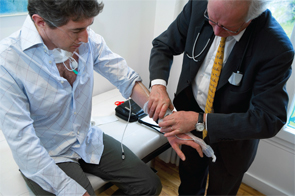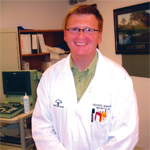
The Altoona Arthritis & Osteoporosis Center has a sleep study area where patients can be assessed for sleep disturbances to help with chronic fatigue.
Image Credit: Image Point Fr/shutterstock.com
It takes adjustment and patience. That sounds like rheumatology. But for Fred Murphy, DO, FACP, FACR, it also defines his other career—drink inventor. From a drink for the whole family to another he claims helps hangovers, creating beverages is a challenge he relishes. “It’s fun to see what I can come up with next,” he says. “You need to try different things.”
Patient Care & Clinical Trials
Trying different things also is a philosophy Dr. Murphy and his practice, the Altoona Arthritis & Osteoporosis Center, Duncansville, Pa., try to embrace, he says. After all, not many practices have a sleep study area as part of their offerings. “A good [number] of rheumatology patients are actually struggling because of sleep apnea,” he says. “We had one gentleman who had to take a nap just to do the eight-minute drive from work to home. We put him in a study here and found out restless leg syndrome had been keeping him up for years. It led to a major improvement. If we had wanted to do a study and had him go to a separate sleep clinic, I think it might have been months before there would have been a spot for him.”
Clinical trials are also a major focal point for the practice, which currently has more than 100 in progress. For some patients, Dr. Murphy points out, participating could be a benefit beyond what their insurance covers. At the front end, patients are asked if participating in a trial is something of interest to them, and it’s their call if the discussion ends there.
A typical day for Dr. Murphy sees patient appointments starting at 7:30 and running at about four to five an hour. His philosophy throughout the day is to listen closely to the people of his region, those he characterizes as extremely hard working.
“This is Western Pennsylvania, and there are many hunters and those who like to fish,” he says. “These are people who will push themselves to work and keep up the house. But, when they’re having rheumatology problems, they’ll stop doing their outdoor activities first. If I hear they’ve stopped, I know what they’re probably not telling me. I need to make them feel comfortable to make changes to help.”
Changes can be tough for patients to accept. Dr. Murphy feels you can have a higher success rate if you create a team feeling. He likes to explain to the patient why a strategy is necessary—not be the doctor who just orders and expects to be followed. “They have more of a chance to follow [a treatment plan] if you take the time to explain it in a way that they can really understand,” he says. “What’s the use of a great strategy if it’s never taken to heart by the patient?”
The clinical trials have given him a strong balance that he says keeps the day fresh. “The trials are phenomenal,” he says. “We’ve been a part of so many—from B cell to JAK-STAT pathways,” he says. “We do all phases—Phase I through Phase IV. It definitely keeps it interesting to look at the mechanism of action for different molecules.”
But as much as anything, rheumatology enthuses him because he finds it to be an area of medicine more likely to have positive results. “I think I had a very open mind in medical school, and when I did my rheumatology rotation, it seemed patients so often were getting better with treatment. … That’s something that can make you feel good at the end of the day.”
Drinking It In
Dr. Murphy gets a break from the rheumatology routine by creating beverages of choice for consumers. Choosing the ingredients he wants to use and working with the beverage house—the very one used for Arizona Iced Tea—can take quite a bit of fine-tuning, but it’s all a part of trying to make the drink a palate pleaser. Dr. Murphy says, “Hey, we have to titrate medication in rheumatology, don’t we?”
His latest drink, called Formula 5, is so named, he says, because it tries to fulfill five requirements: hydration, antioxidants, vitamins, electrolytes and nutrients. And Dr. Murphy says he has other potential drinks in mind.
“I would actually love to create a drink that would help people’s arthritis,” he says, “maybe somehow incorporate antiinflammatory properties.”
Eric Butterman is a Texas-based freelance writer. Contact him via e-mail at [email protected].
Career Highlights

Dr. Murphy
Fred Murphy, DO, FACP, FACR, received his medical degree from the Philadelphia College of Osteopathic Medicine. He completed his Internal Medicine residency and Rheumatology Fellowship training at the Walter Reed Army Medical Center and served as chief of rheumatology at Brook Army Medical Center in San Antonio, Texas, prior to joining AAOC/ACCR.
Dr. Murphy is actively engaged in clinical research and has published articles and book chapters on a number of rheumatic conditions, including osteoporosis, lupus, rheumatoid arthritis, sarcoidosis, scleroderma, psoriatic arthritis, polymyositis and medical education. At the present time, Dr. Murphy maintains a faculty appointment as a clinical assistant professor of medicine at the University of Pennsylvania School of Medicine.



